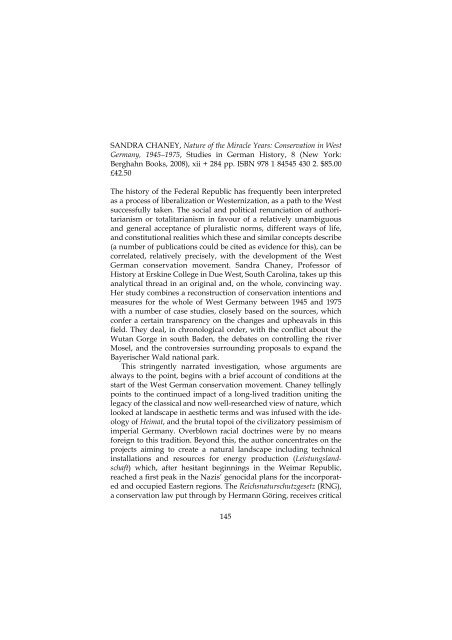Download - German Historical Institute London
Download - German Historical Institute London
Download - German Historical Institute London
Create successful ePaper yourself
Turn your PDF publications into a flip-book with our unique Google optimized e-Paper software.
SANDRA CHANEY, Nature of the Miracle Years: Conservation in West<br />
<strong>German</strong>y, 1945–1975, Studies in <strong>German</strong> History, 8 (New York:<br />
Berghahn Books, 2008), xii + 284 pp. ISBN 978 1 84545 430 2. $85.00<br />
£42.50<br />
The history of the Federal Republic has frequently been interpreted<br />
as a process of liberalization or Westernization, as a path to the West<br />
successfully taken. The social and political renunciation of authoritarianism<br />
or totalitarianism in favour of a relatively unambiguous<br />
and general acceptance of pluralistic norms, different ways of life,<br />
and constitutional realities which these and similar concepts describe<br />
(a number of publications could be cited as evidence for this), can be<br />
correlated, relatively precisely, with the development of the West<br />
<strong>German</strong> conservation movement. Sandra Chaney, Professor of<br />
History at Erskine College in Due West, South Carolina, takes up this<br />
analytical thread in an original and, on the whole, convincing way.<br />
Her study combines a reconstruction of conservation intentions and<br />
measures for the whole of West <strong>German</strong>y between 1945 and 1975<br />
with a number of case studies, closely based on the sources, which<br />
confer a certain transparency on the changes and upheavals in this<br />
field. They deal, in chronological order, with the conflict about the<br />
Wutan Gorge in south Baden, the debates on controlling the river<br />
Mosel, and the controversies surrounding proposals to expand the<br />
Bayerischer Wald national park.<br />
This stringently narrated investigation, whose arguments are<br />
always to the point, begins with a brief account of conditions at the<br />
start of the West <strong>German</strong> conservation movement. Chaney tellingly<br />
points to the continued impact of a long-lived tradition uniting the<br />
legacy of the classical and now well-researched view of nature, which<br />
looked at landscape in aesthetic terms and was infused with the ideology<br />
of Heimat, and the brutal topoi of the civilizatory pessimism of<br />
imperial <strong>German</strong>y. Overblown racial doctrines were by no means<br />
foreign to this tradition. Beyond this, the author concentrates on the<br />
projects aiming to create a natural landscape including technical<br />
installations and resources for energy production (Leistungs land -<br />
schaft) which, after hesitant beginnings in the Weimar Republic,<br />
reached a first peak in the Nazis’ genocidal plans for the incorporated<br />
and occupied Eastern regions. The Reichsnaturschutzgesetz (RNG),<br />
a conservation law put through by Hermann Göring, receives critical<br />
145













